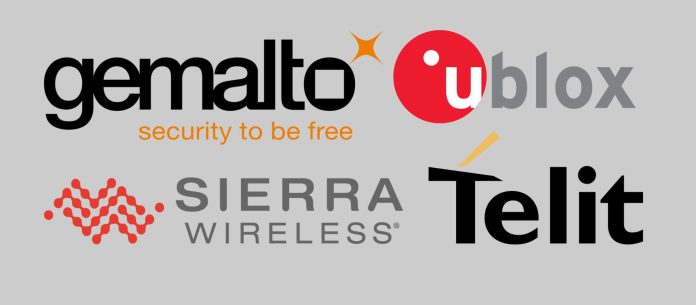Well established North American and European manufacturers of M2M and IoT devices have seen their share of global shipments slip by 15 per cent in the last 12 months as Chinese vendors have flooded the market with low-value 2G kit, and ramped up their NB-IoT activities at the same time.
Chinese vendors took 60 per cent of NB-IoT shipments in 2017, according to a report by ABI Research. Their aggressive focus on both NB-IoT and LTE-M could see them take an even higher proportion of device shipments during 2018 and 2019.
Prominent North American and European brands have shored up their share of revenues in the combined machine-to-machine (M2M) and ‘internet-of-things’ (IoT) module market, said ABI.
Collectively, brands like Sierra Wireless, Gemalto, Telit, and u-Blox took around 60 per cent of the US$2 billion sales in the sector in 2017, said ABI. These brands have maintained a steady share as the market has doubled its value in the last five years.
But their total share of shipments has plummeted at the same time, from 55 per cent in 2016 to just 40 per cent last year. Chinese vendors are gaining ground, said ABI, with a focus on 2G modules, which continue to find a global audience, even if markets like the US have switched off 2G services.
“High-category LTE products will drive revenues while paired-back LTE-M and NB-IoT will drive volume,” commented Jamie Moss, research director at ABI Research.
The module market will be spurred again in 2018-19 as low-cost LTE-M and NB-IoT shipments come on stream. Chinese manufacturers will, again, steal share from their Western equivalents, reported ABI.
Their dominance was illustrated by the escalating bids for Shanghai-based SIMCom Wireless Solutions in 2017, including a failed attempt from Swiss firm u-Blox. In the end, it was sold to Shenzhen Sunsea, noted ABI.
“No one can be said to own the cellular low-power wide-area (LPWA) market. But it is there, especially in the supply of NB-IoT, that the number of Chinese vendors is proliferating,” it said in a statement.
But Moss reflected NB-IoT brings with its “designed-in commoditisation”, meaning success in terms of shipments will not translate directly into success in revenue generation without exponential scale in volume.
“This means that NB-IoT will need to be monetised differently, the hardware share of the technology’s value will be at an all-time low – even by the acutely-optimised standards of the module market,” said Moss.
“It is the vendors that can lever platform competency into their module offering, to allow hardware sales to become the lead for alternative revenue streams, that will be most successful. Sierra Wireless has been a vocal proponent of this approach and it may be prescient that it took a market-leading 23 per cent of all module revenue in 2017.”

